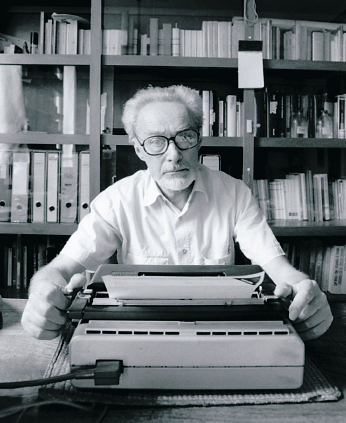Understanding World Societies:
Printed Page 944
INDIVIDUALS IN SOCIETY
Primo Levi

Most Jews deported to Auschwitz were murdered as soon as they arrived, but the Nazis made some prisoners into slave laborers, and a few of these survived. Primo Levi (1919–
Like many in Italy’s small Jewish community, Levi’s family belonged to the urban professional classes. The young Primo Levi graduated in 1941 from the University of Turin with highest honors in chemistry. Since 1938, when Italy introduced racial laws, he had faced growing discrimination, and two years after graduation he joined the antifascist resistance movement. Quickly captured, he was deported to Auschwitz with 650 Italian Jews in February 1944. Stone-
Nothing had prepared Levi for what he encountered. The Jewish prisoners were kicked, punched, stripped, branded with tattoos, crammed into huts, and worked unmercifully. Hoping for some sign of prisoner solidarity in this terrible environment, Levi found only a desperate struggle of each against all and enormous status differences among prisoners. Many stunned and bewildered newcomers, beaten and demoralized by their bosses — the most privileged prisoners — collapsed and died. Others struggled to secure their own privileges, however small, because food rations and working conditions were so abominable that ordinary Jewish prisoners perished in two to three months.
Sensitive and noncombative, Levi found himself sinking into oblivion. But instead of joining the mass of the “drowned,” he became one of the “saved” — a complicated surprise with moral implications that he would ponder all his life. As Levi explained in Survival in Auschwitz (1947), the usual road to salvation in the camps was some kind of collaboration with German power.* Savage German criminals were released from prison to become brutal camp guards; non-
For Levi, compromise and salvation came from his profession. Interviewed by a German technocrat for the camp’s synthetic rubber program, Levi performed brilliantly in scientific German and savored his triumph as a Jew over Nazi racism. Work in the warm camp laboratory offered Levi opportunities to pilfer equipment that could then be traded to other prisoners for food and necessities. Levi also gained critical support from three saintly prisoners who refused to do wicked and hateful acts. And he counted “luck” as essential for his survival: in the camp infirmary with scarlet fever in February 1945 as advancing Russian armies prepared to liberate the camp, Levi was not evacuated by the Nazis and shot to death like most Jewish prisoners.
After the war Primo Levi was forever haunted by the nightmare that the Holocaust would be ignored or forgotten. Always ashamed that so many people whom he considered better than himself had perished, he wrote and lectured tirelessly to preserve the memory of Jewish victims and guilty Nazis. Wanting the world to understand the Jewish genocide in all its complexity so that never again would people tolerate such atrocities, he grappled tirelessly with his vision of individual choice and moral compromise in a hell designed to make the victims collaborate and persecute each other.
QUESTIONS FOR ANALYSIS
- Describe Levi’s experience at Auschwitz. How did camp prisoners treat each other? Why?
- What does Levi mean by the “gray zone”? How is this concept central to his thinking?
- Will a vivid historical memory of the Holocaust help prevent future genocide? Why or why not?

DOCUMENT PROJECT
What choices did Holocaust survivors face? Listen to testimonies from Holocaust survivors, and then complete a quiz and writing assignment based on the evidence and details from this chapter. See Document Project for Chapter 30